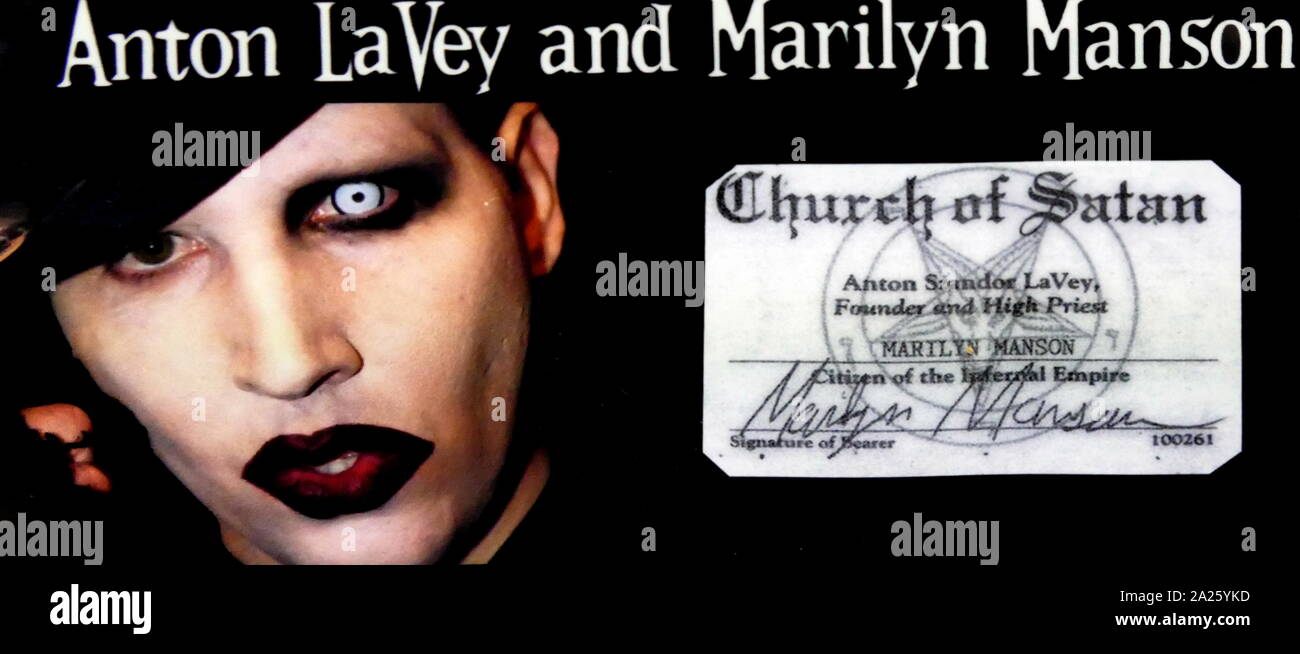Marilyn Manson, a name that evokes a myriad of emotions, opinions, and discussions, is undeniably one of the most controversial figures in contemporary music. His theatrical persona, coupled with his provocative lyrics, has led many to label him as a satanist. But how much of this characterization is rooted in truth, and how much is mere sensationalism? As we peel back the layers of Manson's artistry, we delve into the complexities of his identity, the symbolism in his work, and the public perception that has followed him throughout his career.
Born Brian Hugh Warner, Marilyn Manson's rise to fame in the 1990s was marked by an unapologetic embrace of the macabre, which naturally led to speculation about his beliefs and affiliations. The artist himself has played into these narratives, often using shock value to provoke thought and discussion. However, distinguishing between the persona of Marilyn Manson and the man behind the mask is crucial in understanding the truth behind the label of "satanist." This article aims to explore the roots of Manson's imagery, its implications, and the reality of his beliefs.
The term "satanist" is often misused and misunderstood, leading to a plethora of assumptions about individuals like Manson. To fully grasp the essence of Marilyn Manson's relationship with this label, we must look at his biography, artistic expression, and the cultural context surrounding his work. Are his actions and lyrics a genuine reflection of satanic beliefs, or is it a mere performance art designed to challenge societal norms? Join us as we embark on this journey of exploration.
Who is Marilyn Manson? A Brief Biography
Marilyn Manson, born Brian Hugh Warner on January 5, 1969, in Canton, Ohio, is an American singer, songwriter, actor, and visual artist renowned for his controversial stage persona and image. He is the lead vocalist of the band Marilyn Manson, which he formed in 1989. Known for his theatrical performances and elaborate makeup, Manson's music often touches on themes of horror, religion, and societal issues, making him a polarizing figure in the music industry.
| Personal Details | Bio Data |
|---|---|
| Name | Marilyn Manson |
| Birth Date | January 5, 1969 |
| Birth Place | Canton, Ohio, USA |
| Occupation | Musician, Actor, Artist |
| Genres | Industrial Rock, Alternative Metal |
| Years Active | 1989 – Present |
What Influenced Marilyn Manson's Artistic Style?
Marilyn Manson's artistic style is a confluence of various influences, including literature, cinema, and personal experiences. He draws inspiration from authors such as H.P. Lovecraft and William S. Burroughs, whose themes often delve into darkness and the human psyche. Additionally, horror films have heavily influenced Manson's visual aesthetics and performance art, creating a unique blend of music and theatrical storytelling.
How Does Marilyn Manson Address Themes of Religion and Satanism?
Marilyn Manson's work frequently challenges conventional religious beliefs. His lyrics often critique organized religion, questioning morality and the nature of good and evil. This has led to accusations of satanism, as he uses symbols and imagery associated with satanic practices. However, Manson has stated that his intent is not to promote satanism but to provoke thought and discussion about the hypocrisy of societal norms.
Is Marilyn Manson Really a Satanist?
The question of whether Marilyn Manson is a satanist is complex. While he has incorporated satanic imagery into his performances, he has also expressed that his beliefs are rooted in individualism and self-exploration rather than a devotion to Satan. Manson himself has described his work as a critique of societal norms, using shock value to draw attention to deeper issues. Thus, labeling him a satanist may oversimplify the nuances of his beliefs.
What Role Does Controversy Play in Marilyn Manson's Image?
Controversy has been a significant aspect of Marilyn Manson's career. From his early days, he has pushed boundaries, often inviting criticism and outrage from conservative groups and religious organizations. This controversy has become a cornerstone of his brand, allowing him to challenge societal norms and engage audiences in discussions about morality, identity, and self-expression.
How Has the Media Portrayed Marilyn Manson's Satanic Image?
The media has played a crucial role in shaping the public perception of Marilyn Manson as a satanist. Sensational headlines and exaggerated narratives have often overshadowed the artist's actual beliefs and intentions. This portrayal can lead to a misunderstanding of his work, as many focus solely on the shocking elements without considering the underlying messages present in his music and performances.
What Are the Implications of Labeling Marilyn Manson as a Satanist?
Labeling Marilyn Manson as a satanist carries significant implications, affecting how audiences interpret his art and persona. It can lead to the stigmatization of his work, limiting the appreciation of the artistry behind it. Furthermore, such labels can perpetuate harmful stereotypes about artists who explore dark themes and challenge societal norms, ultimately hindering open dialogue about important issues.
Conclusion: The Duality of Marilyn Manson's Persona
Marilyn Manson embodies a complex duality that straddles the line between art and provocation. While he has often been labeled a satanist, this title fails to capture the depth of his beliefs and the artistic intentions behind his work. By examining the various influences, themes, and societal reactions to Manson's persona, we can gain a more nuanced understanding of his contributions to music and culture. Ultimately, Marilyn Manson's legacy will continue to spark debate and discussion, challenging us to confront our perceptions of art, identity, and belief.
Bill Cosby: The Legacy And Controversy Surrounding His Death
Unveiling The Life Of John Gotti's Wife: A Journey Through Love And Loyalty
Unveiling The Mystery Of Kimberly Fey's Parents

